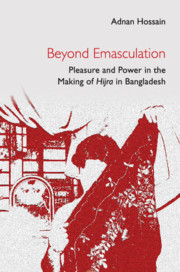Book contents
- Frontmatter
- Dedication
- Contents
- List of Figures
- Acknowledgements
- Introduction: Pleasure, Power and Masculinities
- 1 Kinship, Community and Hijragiri
- 2 Class-Cultural Politics and the Making of Hijras
- 3 Hijra Erotic Subjectivities: Pleasure, Practice and Power
- 4 The Paradox of Emasculation
- 5 Practices and Processes of Gendering
- 6 Love and Emotional Intimacy: Hijra Entanglement with Normative Bangla Men
- 7 Contemporary Transformation of Hijra Subjectivities
- Conclusion: Shifting Meaning and the Future of Hijras
- Glossary
- References
- Index
Conclusion: Shifting Meaning and the Future of Hijras
Published online by Cambridge University Press: 06 August 2021
- Frontmatter
- Dedication
- Contents
- List of Figures
- Acknowledgements
- Introduction: Pleasure, Power and Masculinities
- 1 Kinship, Community and Hijragiri
- 2 Class-Cultural Politics and the Making of Hijras
- 3 Hijra Erotic Subjectivities: Pleasure, Practice and Power
- 4 The Paradox of Emasculation
- 5 Practices and Processes of Gendering
- 6 Love and Emotional Intimacy: Hijra Entanglement with Normative Bangla Men
- 7 Contemporary Transformation of Hijra Subjectivities
- Conclusion: Shifting Meaning and the Future of Hijras
- Glossary
- References
- Index
Summary
Hijras serve as the long-running, emblematic figure of South Asian sexual and gender difference. The publicly institutionalized position of the hijras across South Asia is a testament to the continued existence of an alternative subculture that survived criminalization and eradication at different points in colonial and postcolonial history. More recently, there is a renewed interest in hijras both regionally and internationally with the legal recognition of a third gender in several South Asian countries including Bangladesh, Nepal, Pakistan and India. That a third gender has been legally recognized while same-sex sexualities remain criminalized in several countries in South Asia continues to arouse curiosity about the relationship between the hijra subject position and same-sex sexuality. The outbreak of the HIV epidemic and the crystallization of LGBT identities in the Western metropolises and their spread across the world have also led to a resurgence of interest in alternative and putatively ‘native’ sex/gender subjects, including the hijras.
Hijra as an alternative gender/sex and its discursive consolidation as a third gender/sex worked to destabilize the so-called sex–gender dimorphism of the Western world (Nanda 1999). Critical social science research has, however, challenged such an easy reading of the hijras as a third gender or sex by pushing us to take into account the way gender and sexual difference are embedded in other forms of social difference, including class, caste, kinship, transnationalism and desire (Cohen 1995; Reddy 2005a). More importantly, this critical body of research alerts us to the incapacity of a third sex/gender framework to account for the complex interaction among gender, sexuality and the social, economic and political context in which hijra lives are implicated. This book departs from well-trodden territory in that it goes beyond critiquing the so-called third sex/gender paradigm and brings into view structural inequalities of gender and sexuality that produce the hijra subject in the first place. In place of either a transgender or third sex perspective, too often readily employed in the analysis of gender-variant people in the Global South, this book adopts masculinity as a lens. A focus on masculinity brings into view not only the process of ideological abjection of the hijras but also the various actions and doings through which hijras craft their own subject position.
- Type
- Chapter
- Information
- Beyond EmasculationPleasure and Power in the Making of <I>hijra</I> in Bangladesh, pp. 205 - 209Publisher: Cambridge University PressPrint publication year: 2021



